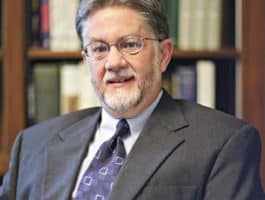
Helping Your Child Understand the Holy Spirit
How, and what, do you teach your children about the Holy Spirit? Professor Bruce Ware helps equip parents to teach their children about the Holy Spirit in terms that even boys and girls can understand.
Show Notes
About the Host
About the Guest
-
How, and what, do you teach your children about the Holy Spirit? Professor Bruce Ware helps equip parents to teach their children about the Holy Spirit in terms that even boys and girls can understand.
-
Dave and Ann Wilson
Dave and Ann Wilson are hosts of FamilyLife Today®, FamilyLife’s nationally-syndicated radio program. Dave and Ann have been married for more than 38 years and have spent the last 33 teaching and mentoring couples and parents across the country. They have been featured speakers at FamilyLife’s Weekend to Remember® marriage getaway since 1993 and have also hosted their own marriage conferences across the country. Cofounders of Kensington Church—a national, multicampus church that hosts more than 14,000 visitors every weekend—the Wilsons are the creative force behind DVD teaching series Rock Your Marriage and The Survival Guide To Parenting, as well as authors of the recently released book Vertical Marriage (Zondervan, 2019). Dave is a graduate of the International School of Theology, where he received a Master of Divinity degree. A Ball State University Hall of Fame quarterback, Dave served the Detroit Lions as chaplain for 33 years. Ann attended the University of Kentucky. She has been active alongside Dave in ministry as a speaker, writer, small-group leader, and mentor to countless wives of professional athletes. The Wilsons live in the Detroit area. They have three grown sons, CJ, Austin, and Cody, three daughters-in-law, and a growing number of grandchildren.
-

Bruce Ware
Ware is a highly esteemed theologian and author in the evangelical world. He came to Southern Seminary from Trinity Evangelical Divinity School where he served as chairman of the Department of Biblical and Systematic Theology. Prior to this, he taught at Western Conservative Baptist Seminary and Bethel Theological Seminary. Ware has written numerous journal articles, book chapters, and book reviews and, along with Thomas Schreiner, co-edited Still Sovereign. He also has authored&n...more
Bruce Ware helps equip parents to teach their children about the Holy Spirit in terms that even boys and girls can understand.
Bob: I remember thinking, “Well, then, I want to read the Bible!”
Dennis: Did you buy it at that point?
Bob: I went home and started reading my Bible, and I did not find the exciting parts when I tried to dive right into it. [Laughter] I said, “I don’t see any techno-pen,”—
3:00
—where they were communicating on their pen—like they were in The Man from U.N.C.L.E.
Dennis: Yes.
Bob: I kind of gave up on it right away, but his intention was good! He was trying to point us in the right direction.
Dennis: Ultimately, he is right; but for a parent or a pastor of a six- or a seven-year-old—who is competing with the high-tech nature of media—
Bob: I didn’t quit watching The Man from U.N.C.L.E.—I’ll tell you that!
Dennis: Yes, there you go. This week, we’ve been talking about how we can teach biblical truth about who God is to our children because it’s a command of Scripture that parents are to begin this relay race. Actually, they’re to continue the relay race. Maybe some of the parents didn’t grow up in a Christian home; but you know what? They can start their own relay race of truth.
With us is a professor, who has become the Professor of Practical Theology, here of FamilyLife Today, equipping parents to be able to do that—Dr. Bruce Ware. Bruce, welcome back.
Bruce: Thank you, Dennis.
4:00
Dennis: Now, he does that professionally at Southern Baptist Theological Seminary. He is the professor of Christian Theology. We’ve dubbed you, here, of Practical Theology.
Bob: Isn’t there something in your bio—haven’t you taught a course called “Practical Theology”?
Bruce: Oh, sure.
Bob: Yes; there you go!
Dennis: Well, he has taught it to his children, Bethany and Rachel, and dedicated a book to them. It’s called Big Truths for Young Hearts; and it’s teaching and learning about the greatness of God. It’s all about a big word called “theology.”
Bruce: Yes.
Dennis: It means passing on the truth about who God is. Bruce, if Barbara was here, this is something she would get on her soapbox about because she really doesn’t think that we, as parents, are equipped to be able to teach our children about the Trinity, in general,—
Bruce: Yes.
Dennis: —and specifically about who the Holy Spirit is, and what His purpose is, and why He came,—
Bruce: Yes.
Dennis: —and what He’s all about.
So the first question I want you to unpack for us is: “What does the average listener today need to know about the person of the Holy Spirit?”
5:00
Before we get to our kids, let’s just speak to the adults for a moment.
Bruce: Right. You know, when you look at Scripture itself of the teaching of the Spirit, there is one thing that is so clear all the way through—and that is, He is the—His primary role is empowering the work of the Father and the Son. He always assists in some capacity. He comes to empower a prophet to speak the word of the Lord correctly; but it’s generally not a word about Himself, for the most part. In fact, you can even think of the whole Bible as being inspired by the Spirit—2 Peter 1, verses 20 and 21 says, “Men moved by the Holy Spirit spoke from God.” And yet the Bible is not principally autobiographical—it’s the Spirit’s inspiring men to write about Christ, primarily.
Dennis: Yes.
6:00
Bruce: You realize—boy, when you see the Spirit rightly from the Bible, you realize here is One Who, though He is God—He is equal in His essence / in His nature with the Father and the Son—and yet His role all throughout redemptive history is one in which He is an assistant. In fact, some have talked about Him as the forgotten member of the Trinity.
Dennis: Yes.
Bruce: But, in one sense, He wants to be forgotten. You know, when the Spirit indwells a person, the Spirit's presence is made known, not so much in showing for the Spirit, but showing forth Christ. So, really, in everything that the Spirit does, He seeks to bring honor and glory to Christ.
Bob: When I was growing up, and even in trying to explain this to my children, the things that kind of came to mind, when I think about the Holy Spirit, were images from the popular culture— I thought about Tinker Bell from Peter Pan—you know, who is this little fairy, who flies around. I think, in the original Peter Pan, it was kind of a flashlight beam as opposed to an animated figure.
7:00
Do you remember that?
Dennis: Sure; sure.
Bob: And then I remember Casper, the Friendly Ghost.
Dennis: That's what I remember.
Bob: So I think about the Holy Spirit. We talked, of course, about the Holy Ghost in the old days; right?
Bruce: Sure.
Bob: So how do you help a child understand the true nature of what we're talking about when we talk about the person of the Holy Spirit, if they're thinking about Tinker Bell, or Casper, or whatever the modern-day equivalent of those things is?
Dennis: Well, we talk about the Father and the Son. We have illustrations of what a Father and a Son looks like; but when it comes to a person being the Holy Spirit, we don't have a visible illustration.
Bruce: No; we don't. Of course, this is one of those areas—Bob, you mentioned in a previous program, Deuteronomy 29:29, "The secret things belong to the Lord our God." That's the first half of the verse. Of course, that's true here, where we cannot comprehend what it means to be a person without a body / without a brain.
8:00
How do you have a mind without a brain? And yet God is Spirit.
We learn in John 4 the Father Himself is Spirit in nature / does not have a body. Christ—or what I should say—is the Eternal Son, apart from becoming incarnate/ taking on human flesh, does not have a physical existence. So God, as a whole, is Spirit. And the Holy Spirit is one of the persons of the Godhead who, like the other persons of the Godhead, has no body and yet is fully personal—has emotions, thoughts, actions, will—and in fact, carries out all that happens in the universe by the exertion of His power and does so, as a person. Yet, we cannot comprehend what that is because it's beyond our understanding, as human beings.
Dennis: And so here we are, as parents—I mean, I'm listening to you and I have to say, "I hadn't thought about some of those things before you just rattled off. [Laughter]
9:00
Yet, as a parent, I am to introduce my children to who God is—and my grandchildren. One of the members of the Trinity that I need to begin to explain, in terms of a secret, is the Holy Spirit, especially when they place their faith in Christ. Because at the point a person places their faith in Christ, they are baptized with the Holy Spirit—He comes to indwell them and live within them. The choice, then, becomes ours: “Will we be filled with the Spirit?” or “Will we quench or grieve the Spirit?”
Bob: In fact, we often talk about Jesus coming to live in your heart, which is not necessarily a biblical concept. Would we be better off saying that it's the Holy Spirit who comes to live in your heart?
Bruce: Yes, I think where we get that from is when Jesus says, in Matthew 28, "I will be with you always to the end of the age." But how is Christ with His people?
10:00
He is with them through the Spirit whom He sent—His Spirit. Christ is with us as He has sent His Spirit, who will mediate to us / bring to us the very presence of Christ in His work in us and through us.
Dennis: Okay; let's talk about your two daughters, then, Rachel and Bethany. How did you teach them about the Holy Spirit, and when did you start teaching them? Because this was one of the challenges Barbara and I faced. It's why she would raise this question in the first place—is: “How do we teach our kids who He is, what He does, and how—He works?” I almost said it; didn't I?—“…how ‘It’ works?” No; it's not—“It”—it’s "He"—“…how He works in their lives?”
Bruce: Yes. Well, I started when they were pretty young; but I realized—Bethany was about seven years old / Rachel was about four when I started teaching through these truths of the Christian faith. Of course, at first, it was very, very simple—simpler than what I have written in this book for example. I couldn't have taught them all of those things, ages four and five—
11:00
Dennis: Right.
Bruce: —but, honestly, by age of seven and eight, they were actually getting an understanding of many of these truths and much greater grasp of it than I really thought would be possible.
Another thing I just want to say—to encourage parents in this—is never to forget that that same Holy Spirit—maybe is the subject of discussion right now with your children—is the Holy Spirit who is at work in opening eyes to see these truths in ways that could never be understood apart from the Holy Spirit's illumination / His enlightenment. We need, as parents, to realize we really cannot convey what we would like to. Even the things that we do know, we can't convey those things in ways that our children necessarily will get it right, but it requires the work of the Spirit—so to have this dependence / this heart of dependence on what only God can do, by His Spirit, in the lives of our children.
12:00
Dennis: I thought where you were going there, Bruce, for a moment, was: “He is the Spirit of God who convicts a person of their own need for salvation.
Bruce: Yes. Well, that is absolutely true.
Dennis: “And He is the One who creates the new birth that makes an old creature a new creation.” As parents, we can't do that. We want to move our children from the old to the new / from being lost to being a child of God, but we can't do that. We are dependent upon Him to do that in front of our very eyes.
Bruce: That's right, yes; but what the Spirit uses, then, is truth from His Word. I think, sometimes, parents think: "Well, if my children can't get this, then I'm not going to try to convey these truths from the Bible to my children. It's beyond them." But it's not taking into account the way the Spirit can work with that truth. I mean, why did He give that truth to us? He intends to use it.
13:00
I mean, if you look through the Bible, you see "Spirit" and "Word" always go together—so the Spirit uses the Word as His means to open their eyes to see the beauty of the truth and, by that, bring them to Christ and then grow them in Christ.
Bob: So if your child came to you and said: "Daddy, I was praying the other day. This thought came into my mind; and I wondered, ‘Is that from the Holy Spirit?’" First of all, does the Holy Spirit do stuff like that?—put thoughts in our minds when we're praying—and then, secondly, how do we know if that thought is from the Spirit or from somewhere else?
Bruce: Yes. Well, I believe that the Holy Spirit can put thoughts in our minds; that is, lead us to think in particular ways. This is part of His work—to convict us of sin—He brings those things to mind as well as positive things and things that would incline us toward what is good. But the only test we have of whether the Spirit has led in a particular way is from the Word itself—the Scriptures.
14:00
This is the grounding we have of the revelation of God, and we cannot trust our own sense of what the Spirit may have indicated. We just have to be careful to realize that His leading can never come in a form that would violate the clear teaching of Scripture. I mean, a man says, “Oh the Spirit led me to divorce my wife and move in with this other woman.”
Dennis: Oh, yes.
Bruce: “Oh, He did not! I’m sorry! This is in violation of Scripture.” So we have to be careful not to fall off either side of this road we’re on; right?
Dennis: Yes; right.
Bruce: Allow too permissive understanding of the Spirit’s work or rule it out all together—in terms of the Spirit’s inclining our hearts—giving us strong indications, and motivations, and ideas that are given to me. I'm sure, Dennis, the Lord, over the years, has given to you many ideas—
Bob: Yes.
Dennis: No doubt.
Bruce: —by His Spirit.
Dennis: No doubt about it, Bruce.
15:00
What I wanted to pass on to our children goes back to—I believe it’s Psalm 78, where we’re commanded to pass on the truth of God and the testimony of God—which is, first of all, the standard of truth, which we’ve talked about here, the truth of the Bible—but second of all, the experience of God in our lives. That’s what makes a testimony. I think, sometimes, the Christian community gets so afraid of the experiential side—
Bruce: Yes.
Dennis: —we’re afraid to testify.
Bruce: Right.
Dennis: We’re afraid to train our children to know how to respond to the Holy Spirit’s prompting. That’s why I would say to my children: “If you have the thought a couple of times, and it doesn’t betray Scripture, then maybe you need to act on it. Maybe you need to initiate a conversation with that person / maybe you need to go engage with them around a matter that they’re facing.” What I just want to train our kids to do is to walk in the truth of God’s Word and the experience of God on a daily basis by faith.
16:00
Bob: Yes.
Bruce: Amen.
Bob: Bruce, let me ask you what I think a lot of parents really wrestle with—a five-year-old child comes and says, “You know, I would like to pray to ask Jesus to come into my heart.” Mom and Dad are thrilled when a five-year-old child says that. So maybe they get together; and Mom talks, reads some Scripture, prays with the child, and then, she walks away and goes: "Okay, what just happened there? Did my child come to faith? How do I know? What do I do?"
How would you coach a parent, when a child comes home from Vacation Bible School and says, "I prayed at Vacation Bible School to become a Christian today." Do we celebrate with the angels of heaven?—that there is joy in the presence of the angels of God over one sinner who repents?—or do we scratch our head and go, "I wonder if that really took?"
Bruce: Right; right. Well, again, that's a great question, Bob. I do think this is another area where you walk a fine line, and you can err on either of two sides.
17:00
One is by pooh-poohing the whole thing / "Oh, a five-year-old. This couldn't be the case," and really depriving—if, in fact, this conversion has taken place—depriving this child, who is now a believer in Christ, of reveling in forgiveness of sin and entering into eternal life.
On the other hand, you don't want to presume immediately that this, in fact, has happened. So you encourage and say: "Honey, you know, if this was a genuine expression of your life / of your heart and longing, this is wonderful! I rejoice with you. One of the evidences that this is a true belief of your heart is that it will continue. Let's just keep talking.” If it has—my goodness!— it's just the beginning of this growth process, as this child grows to understand better who God is, and what their own sin is, and what Christ has done, and the glories of the riches of His Word.
18:00
Bob: Let me jump ahead now, 12 years later. Your five-year-old is now a seventeen-year-old. You did see, back when they were five, some indication that they had a tender heart for God—they were studying the Word and a lot going on—but now, at seventeen, there is no interest in the things of God. What kind of a conclusion do you draw, as a parent, about what's happened to your child?
Bruce: Well, you pray. You pray a lot for those children, and you never give up praying. You never give up on the power of God to take hold of that life again. If there is a longstanding rebellion / disinterest in the things of God, I do think that you, at some point, begin to wonder whether, as a child, this person really did truly come to Christ / truly was converted because we know, from Scripture, that the evidence of the work of the Spirit in the life of the person is what helps us know that this person truly has been saved.
19:00
But, on the other hand, there can be these long periods of time, and then, someone does come back—the Lord brings them back. I think we need to wait for that, pray for that, hope for that. When that happens, I think sometimes it's hard to know for sure if the person was saved originally or if they came to Christ at this point.
It's a challenge, indeed; but one I think parents need to, again, not fall off on either side—of either dismissing their children as unbelievers altogether, and concluding that there is no hope for them—or of, my goodness, of assuming that that original statement of faith, as a child, was true and not urging them to come back to the Lord.
Dennis: You know, there are two things going on here. One is the simple concept of not hindering your children—
Bruce: Good.
Dennis: —to come into a relationship with Christ—
20:00
and of always making that invitation real clear—that God is interested in knowing us / walking with us. Frankly, the older I get, the more mysterious the new birth really is. Jesus compared it to the wind—you know, you don't see it—you feel it / you see its results; but it's still a bit of a mystery, you know?
Not only not hindering a child but, secondly, not giving them false hope: “Because they made a decision when they were young; therefore, they really are a true follower of Christ.” You know, I can't answer that question for every parent; because it's a difficult one to call—the question that Bob was asking you here.
What we need, as parents, is—we need a way to impart, number one, who God is. Secondly, who we are, in light of who God is; which means, thirdly, we need a Savior—and we need to know God the Father, God the Son, and as we talked about today, God the Holy Spirit.
21:00
This book, Big Truths for Little Hearts—I just think—I think there's going to be a lot of parents benefit from this / aunts and uncles, who may have an objective of teaching their nieces and nephews about who God is because they're the only believer in their family—but in the process of teaching them, you're going to learn a ton, as an adult.
Bob: I think that’s one of the things that I am as excited about as anything else with this book because there are a lot of moms and dads who are going to benefit from hearing a very clear, very understandable explanation about some of the core concepts of the Christian faith. Things that may have been cloudy are going to come into focus for grown-ups as well as for elementary and middle age and high school students.
I hope our listeners will get a copy of your book, which is called Big Truths for Young Hearts. We’ve got copies of the book in our FamilyLife Today Resource Center. You can order, online, at FamilyLifeToday.com; or you can call 1-800-FL-TODAY to order.
22:00
Again, find the book, online, at FamilyLifeToday.com. The title is Big Truths for Young Hearts by Dr. Bruce Ware. Or call to order at 1-800-358-6329—that’s 1-800-“F” as in family”, “L” as in life, and then, the word, “TODAY.”
Now, we want to say, “Happy anniversary!” today to some friends of ours—these are, actually, not just friends / these are colleagues. These are FamilyLife Today friends, who live in Beaver, Pennsylvania. They are actually on staff with us, at FamilyLife; and it’s not today that’s their anniversary—it’s tomorrow. Tomorrow it’ll be 33 years for Scott and Catherine Mercer, who are part of the FamilyLife team, living in Pennsylvania. “Congratulations!” to the Mercers.
It is fun to be celebrating anniversaries along with a lot of our friends this year. This is our 40th year as a ministry.
23:00
We’re spending the year by focusing on how God has used FamilyLife to help more couples celebrate more anniversaries for four decades now.
We want to say, “Thank you,” to those of you who partner with us to make this ministry possible. We’re a listener-supported ministry; and we’re grateful for those of you who will, from time to time, make a donation in support of FamilyLife Today—and for those of you who are Legacy Partners, giving each month to help keep this ministry strong. We appreciate your partnership with us in providing practical biblical help and hope for your marriage and for your family.
If you’d like to make a donation in support of FamilyLife Today, you can do that, online, at FamilyLifeToday.com. You can call 1-800-FL-TODAY and donate over the phone; or you can mail your donation to FamilyLife Today, PO Box 7111, Little Rock, AR; our zip code is 72223.
With that, we’ve got to wrap things up for this week. Thanks for being with us. Hope you have a great weekend. In fact, I hope you and your family are able to worship together in church this weekend. And I hope you join us again on Monday when our friend Dr. Meg Meeker is going to be here to talk about the things that contented moms have in common: “What is it that causes a mom to know contentment and joy?” We’ll explore that with Dr. Meeker on Monday. Hope you can tune in for that.
I want to thank our engineer today, Keith Lynch, along with our entire broadcast production team. On behalf of our host, Dennis Rainey, I'm Bob Lepine. We'll see you back Monday for another edition of FamilyLife Today.
FamilyLife Today is a production of FamilyLife of Little Rock, Arkansas.
Help for today. Hope for tomorrow.
We are so happy to provide these transcripts to you. However, there is a cost to produce them for our website. If you’ve benefited from the broadcast transcripts, would you consider donating today to help defray the costs?
Copyright © 2016 FamilyLife. All rights reserved.
1





